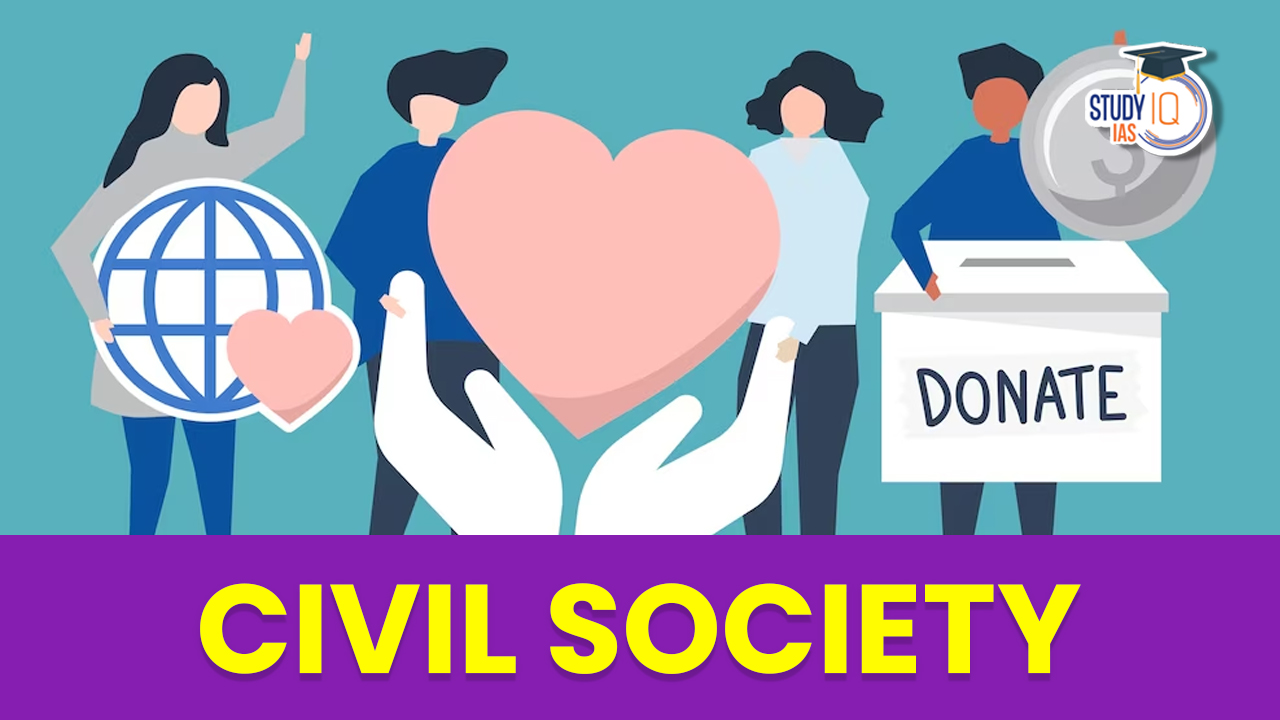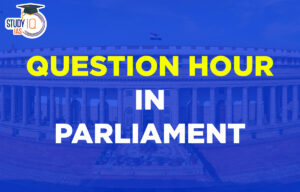Table of Contents
Civil Society
Civil society is also called the third sector of society, separate from the government and businesses. It includes groups like families and private organizations. Essentially, civil society consists of communities or organizations, such as environmental groups, that work outside the government to help people with various issues. It brings together workers, churches, non-profit organizations, and other service groups to provide support and services to the community, usually asking for little in return.
The Civil Society is an important part of Indian Polity which an important subject in UPSC Syllabus. Students can also go for UPSC Mock Test to get more accuracy in their preparations.
Civil Society Introduction
A civil society is made up of associations and businesses that serve the public benefit while operating outside of the governmental and for-profit sectors. Civil sectors are often called civil society. They include workers, churches, non-profits, and service providers that work together to support the community, asking for little in return. The World Bank defines civil society as a broad range of organizations, including foundations, NGOs, faith-based groups, charities, professional associations, and community organizations.
| Characteristics: |
|
Civil Society Centre
The goal of civil society is to create a society where everyone has the freedom to live the life they choose and where the political and economic spheres are held accountable. The goal of civil society is to promote social change in society through the general public, work on policies relating to education, employment, and other areas in both the public and private spheres, put these policies into practice, and interact with decision-makers for guidance and improved outcomes. According to the yearly survey published by the University of Pennsylvania in the 2021 global go-to think tank ranking, we are ranked 83rd globally and 5th in India.
Civil Society Evolution
The focus on civil society has its roots in the 1980s, when political scientists first started to discuss a “representation problem.” Social movements, citizen groups, and non-governmental organisations had replaced political parties and labour unions as the preferred methods of engagement for people everywhere.
By the late 1970s, all of India’s institutions had collapsed, giving rise to a number of populist political movements. The fight against child labour, the right to information, shelter, primary education, and food security has all gained traction in civil society. Other movements such as the anti-caste movement, the fight for gender justice, the fight for civil liberties, a healthy environment, and against mega-development projects that have displaced thousands of impoverished tribals and hill dwellers have also gained ground. Through the filing of Public Interest Litigations and judicial activism, civil society was strengthened.
Civil Society Types
Various civil society organisations include the following:
Civil Rights Advocacy Organization
Since it is well known that civil society supports human rights, this organisation advocates for those rights for particular social groupings. They help a variety of populations, including women, sex workers, HIV patients, migrants, the crippled, tribe members, and many others.
Civil Library Advocacy Organisation
As its name implies, this organization works to advance civil freedoms and human rights for all individuals, not just members of specific communities or classes.
Community-based Organisation
The farmer’s cooperatives or the citizen group are other names for it. This group works to improve public policy issues and public participation in order to raise the standard of living in a particular society.
Need of Civil Society
Citizens can review the actions of their representatives to highlight issues like violations of civil liberties and poor living standards. Article 19 of the constitution protects the right to protest as part of freedom of expression. Participation shouldn’t be limited to just elections and politics; without the right to protest, democracy loses its meaning. Thus, civil society and the state are closely connected.
Role of Civil Society
Civil society organizations, also known as the third sector, encourage cooperation among people through teamwork, networking, and shared goals. Democracies support this cooperative behavior. The Indian Constitution recognizes the “right to freedom of speech and expression and to form associations” under Article 19(1), promoting the formation of civil society groups.
In today’s economic model, the civil society sector is crucial for achieving fair and sustainable development goals. Both government and market approaches have proven inadequate, leading to a growing understanding that the voluntary sector is essential for nation-building.
Civil society organizations operate independently of the government and the market but can influence both to better meet citizens’ needs and rights. They play a vital role in good governance by acting as a bridge between the government and the public, especially in India’s representative democracy, where the government makes most decisions.
Civil Society Issues
The issue is complex, and it is made worse by the fact that India has over a million NGOs with a range of functions, organisational structures, and sizes, as well as the “unorganised” nature of the sector. A list of civil society organisations and their financial backers has been compiled. In order to portray NGOs negatively, funds are stopped, intelligence reports are distributed selectively, and their activities are added on a watch list.
Not all civil society organisations work to uphold the moral consciousness of our culture. Some people are exclusively concerned with getting money from the government or other sources. Some media outlets regularly feel frightened by their corporate overlords and the allure of fame. The Union Ministry of Home Affairs denied 25 NGO licence renewal requests in November 2016 as a result of the Union Home Ministry classifying some NGOs as a security threat to the nation. NGOs like Greenpeace have frequently been charged with being anti-national.
Civil Society Vs NGOs
| Civil Society | NGOs |
| Civil Society is a broader concept, encompassing all organizations and associations that exist outside the state and the market. | NGOs are a part of civil society though they play an important and sometimes leading role in activating citizen participation in socio- economic development and politics and in shaping or influencing policy. |
| Civil society is the set of associations which are neither state nor family but play a positive and active role in social, economic and cultural activities. | NGO is a non-profit, voluntary citizens group which is organized on local, national or international level. |
| Civil society is older concept | NGO is a new concept. |
| Civil society is the third sector of society along with government and business. | NGO is considered the third executive arm of the government. |
| Civil society perform advocacy role | NGO perform both the advocacy and service role. |
| Civil society is the realm of associations, business, interest groups, classes, family and so on. | NGO is non-profit voluntary citizens group. |
Civil Society UPSC
We can infer from the content that the government and the general public are our most significant sources of information. This is seen as they keep an eye on the acts and policies taken by the government. Together, they cooperate with governmental policies and offer a different approach for a certain area of the institutions and private sectors.
Here, we learn that the purpose of civil society is to bring together institutions and NGOs (non-governmental organisations) to represent the will of the people. The institutions and organisations are separate from the society and the government organisations. An essential component of democracy that creates the conditions for good decision-making is civil society. Students can read all the details related to UPSC by visiting the official website of StudyIQ UPSC Online Coaching.


 Question Hour in Parliament: Meaning, Ty...
Question Hour in Parliament: Meaning, Ty...
 List of Governor of States in India, Con...
List of Governor of States in India, Con...
 Maharashtra Bill to Curb Urban Naxalism,...
Maharashtra Bill to Curb Urban Naxalism,...





















